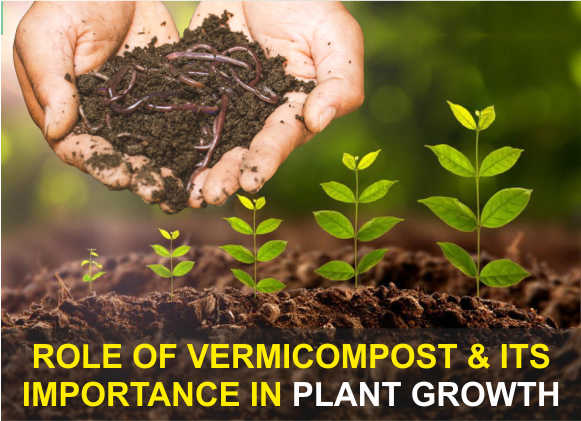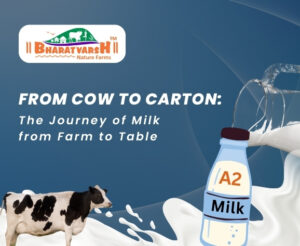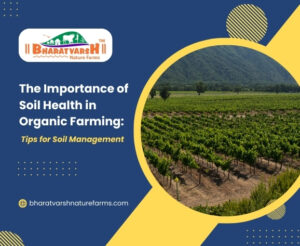What is Vermicompost?
Worm manure, often known as vermicompost or earthworm castings, is a type of worm dung. Many horticulturists believe worm castings to be one of the best soil additives available. The nutrient level of castings is determined by the substance provided to the worms, and worms frequently eat extremely nutritious things like food waste and manure.
Worm castings include a number of chemical substances that are thought to help plant growth. Castings also include a variety of nutrients that are beneficial to plant growth and are in a form that is easily absorbed by plants. The biology of the worm’s gut encourages the growth of helpful microbes for plant growth.
Much of the composition of worm castings, as well as their effects on plants, is still under investigation. Even when the worms are fed low-nutrient materials like paper fibre, farmers have observed the benefits of worm castings on plants, which is turn influences the farm output.
The Idea of Using Worms to Produce Compost
Livestock wastes, poultry litter, dairy wastes, food processing wastes, organic fraction of municipal solid waste, bagasse, digestate from biogas plants, and other wastes could be used to make vermicompost. Straw, husk, leaves, stalks, weeds, and other organic leftovers can all be transformed into vermicompost. Earthworms eat organic trash and reduce it by 40–60% in volume.
Increasing Plant Growth and Yield
Vermicompost has long been recognised as a valuable tool for improving crop yields by improving the physical, chemical, and biological aspects of the soil. Since synthetic mineral fertilizers are prohibited in organic crop production, there has been renewed interest in vermicomposting to turn waste into valuable fertilizer for use in organic crop cultivation.
One of the review articles covered known research on the effects of vermicompost on crop productivity and quality, as well as soil parameters, particularly when using organic management techniques. Several studies concluded that vermicompost treatment resulted in marginally lower or comparable crop growth and production under organic management as compared to mineral fertilizers. Furthermore, it has been widely proven that vermicompost application increases soil health greatly. As a result, vermicompost has the potential to become a significant source for soil enrichment in organic agriculture.
Benefits of Vermicompost
Composting is the process of hastening the natural decay of organic matter. The idea is to improve the soil composition by reusing garbage in your garden.
Livestock waste and kitchen garbage are the major donors to composting. Scraps from meal preparations as well as cooking ingredients can be thrown into a compost bin to help your soil and mulch. Vermicomposting is a useful addition to the composting process that boosts the value of nutrients being returned to the soil through compost.
Here are a few benefits of vermicomposting:
- Vermicompost helps in the improvement of soil structure, texture, porosity, water holding capacity, drainage, and aeration, as well as the reduction of erosion.
- Vermicomposting generates nutrient-rich castings for your garden, as well as helps to divert waste from landfills.
- less space is needed for vermicomposting compared to traditional composting: A bin with a few square feet of surface area and a depth of 8-16 inches works well. Five-gallon buckets buried in the ground have the same effect.
- Less energy is needed for vermicomposting process: You won’t have to measure temperature or turn the pile because the worms will do it for you.
- Faster production of compost: Red wiggler worms eat half their weight in food waste daily.
This varies depending on the temperature of your compost pile, but it usually takes 3 to 12 months for a compost pile to be ready. Every three months, vermicomposting should be ready.
- It enhances plant growth by allowing the development of new shoots and leaves, resulting in increased productivity.
- It helps neutralize the soil’s pH.
- Vermicompost boosts microbial activity in the soil, introduces beneficial bacteria, and reduces insect and disease incidence.
- Vermicompost comprises a variety of micro and macronutrients, vitamins, enzymes, and hormones such as auxins and gibberellins, among other things.
- Vermicompost is simple to use and manage, as well as cost-effective and odourless.
When to use Vermicompost?
- While Planting the Seeds
Vermicompost is an excellent supplement for starting seeds since it is nutrient-rich and aids in the growth of young plants. Simply add a small amount to the seed-starting medium if you’re starting seeds indoors. Simply sprinkle it down the trench or into the seed holes you drilled for outdoor seed planting.
When planting, add a handful of compost to each hole. You can add a half-inch layer of compost around the base of the plants if they start to grow quickly. Provide 1/2 inch of compost layer to “heavy feeder” plants like tomatoes, maize, and squash once a month for fantastic results!
- While plants are growing
While the plants are actively growing, add soil amendments with a high nutritional value. I’m not saying you shouldn’t put it in the garden bed whenever you like, but that’s when it makes the most sense for the plants. Both vegetable and ornamental plants can benefit from vermicompost’s outstanding water-holding properties in the spring, summer, and fall.
Simply apply your compost tea to the drip line of any plant to use it as a top dressing. The drip line runs around the plant’s perimeter and begins at the plant’s longest outward branches. Imagine spraying water onto the branches of a plant or tree from the top; the drip line is the area where the water would “drip off” and settle on the ground surrounding the plant (or tree). The small roots in this area absorb a lot of water and nutrients.
How to use Vermicompost?
You can use your compost right away, or store it and use it later, such as during the planting season. As a soil additive, the compost can be added straight into your potting soil or garden soil to aid in the availability of nutrients to plants. Alternatively, you can use the compost as a top treatment for both indoor and outdoor plants. You may either use your vermicompost right away or keep it for up to an year to use during the gardening season.
Pure vermicompost should not be used in pots or containers. Vermicompost and potting soil should be mixed at a 1:4 ratio. Vermicompost can also be used to make “compost tea.” Simply fill your water bucket or rain barrel with 1-2″ of compost. Allow a day for the compost and water to “steep,” mixing occasionally. After that, water your plants as usual. The resulting liquid fertilizer “tea” can be sprayed near plant roots. This aids in availability of nutrients already present in the soil to plants.
- Use like compost – When mulching grow beds or preparing new beds, dig it lightly into the earth, or apply a light top dressing around mature plants, shrubs, and trees. Because vermicompost goes three times as far as typical (aerobic) compost, use one-third the amount. 3 tablespoons of vermicompost per plant is usually sufficient. Then, water each plant thoroughly, making sure to soak in the worm compost you just applied, which will aid in the nutrient absorption.
- Use for germinating seeds – A growth medium for seedlings made of 50/50 castings and potting soil gives plants a great start in life.
- Use on transplants – Spray roots with a diluted “worm tea” solution to help reduce transplant shock, especially bare-root transplants.
- Store in a dark, cool place – Keep the castings in a breathable container so they don’t dry out. The active microorganisms can last up to a year.
Buy Vermicompost Online in India
The vermicompost at Bharatvarsh Nature Farms is made using the vermibed method from the cow dung of desi cows in our Gaushala. Our Vermicompost is a high-quality purely organic product and is extra rich in Nitrogen, Phosphorus, and potassium (NPK). During the manufacturing process, we add:
- Cow urine for maintaining humidity of Vermicompost beds, which adds the natural nitrogen content to the end product
- Rock phosphate (natural phosphorus stone powder) for soluble phosphorus content in the end product
- Neem leaves for the potassium enrichment in the end product.
Vermicompost increases the biological, chemical, and physical aspects of the soil by containing more nutrients that are readily available to plants. Furthermore, our Vermicompost also provides disease resistance to plants due to this addition of cow urine and Neem leaves during the manufacturing process.
Contact Us:
You can now buy our vermicompost and dairy products in Nagpur and Umred, as we are situated At Post Virli, Taluka Umred, Nagpur dist. – 441204 (MH)
Also, if you are interested in daily subscription and purchase of our dairy products, you can always write to us for any enquiry @ info@bharatvarshnaturefarms.com
For more information and to place your order, visit the website www.bharatvarshnaturefarms.com
Call Us @ 8603214214




